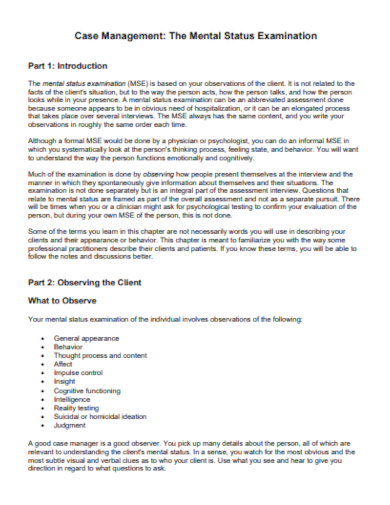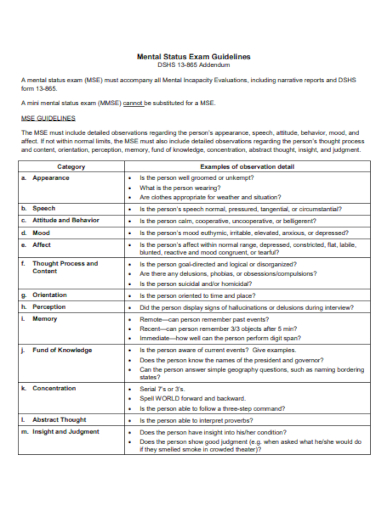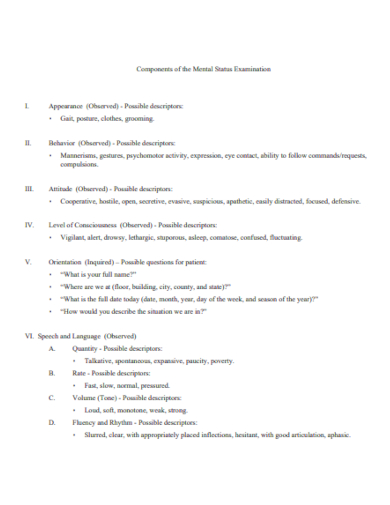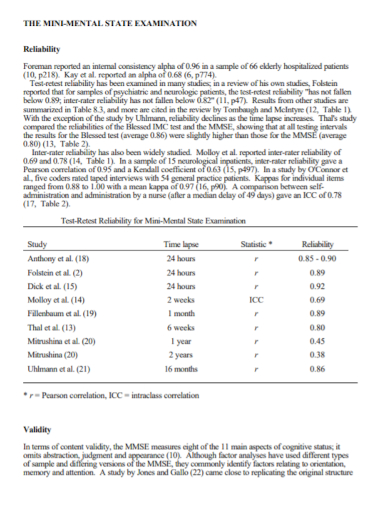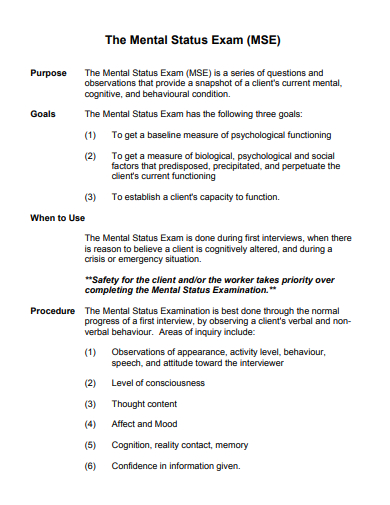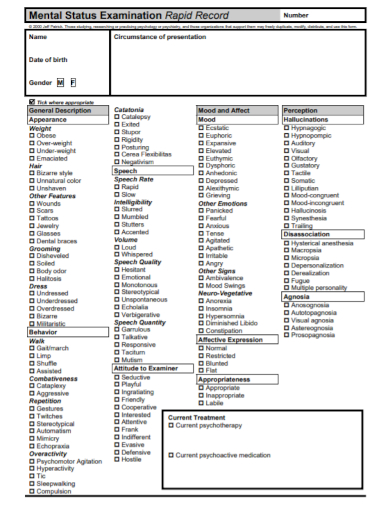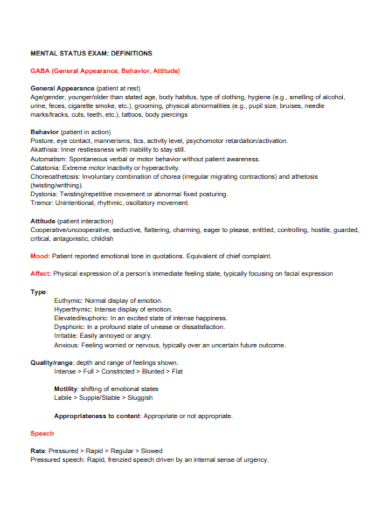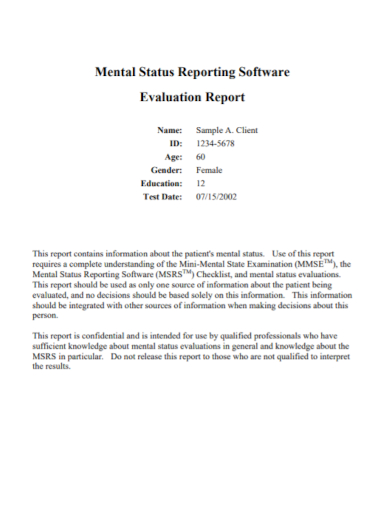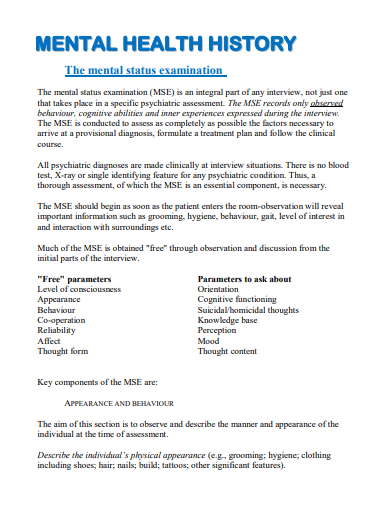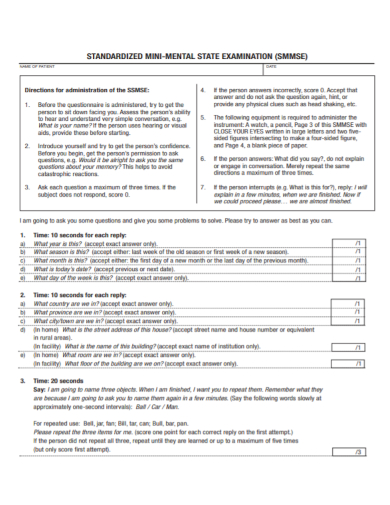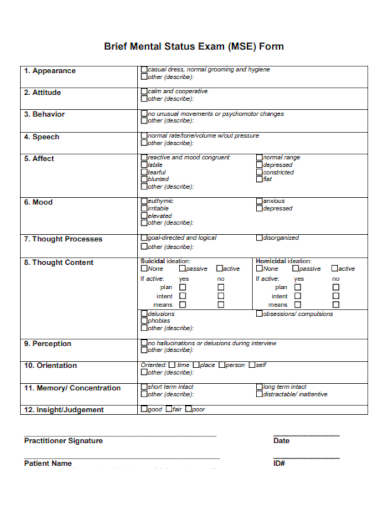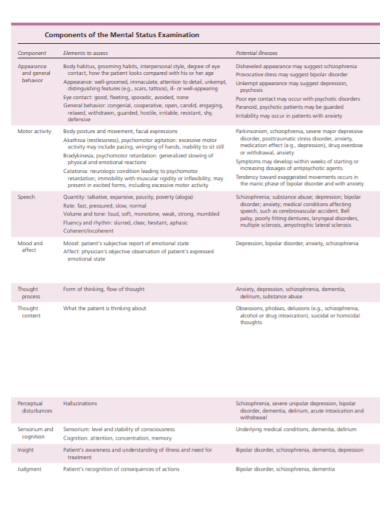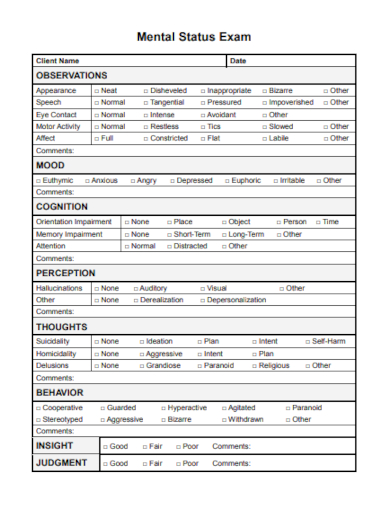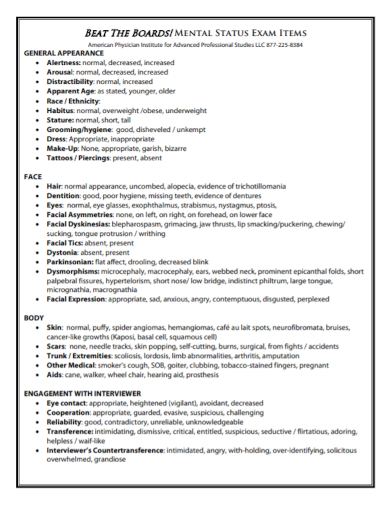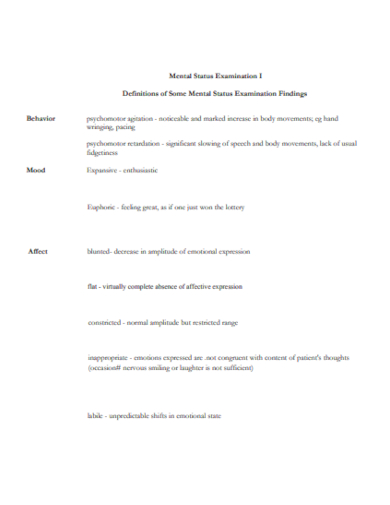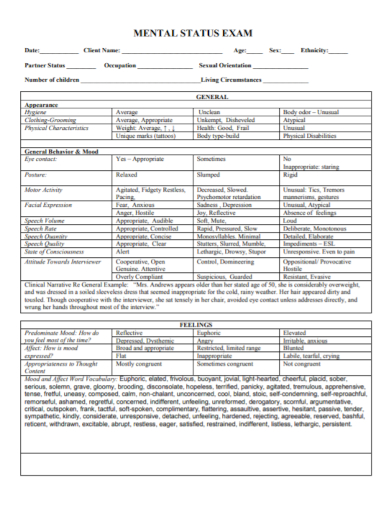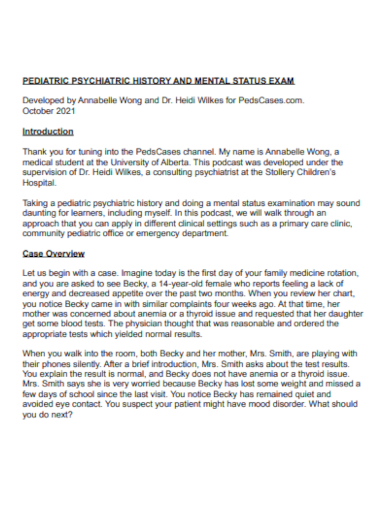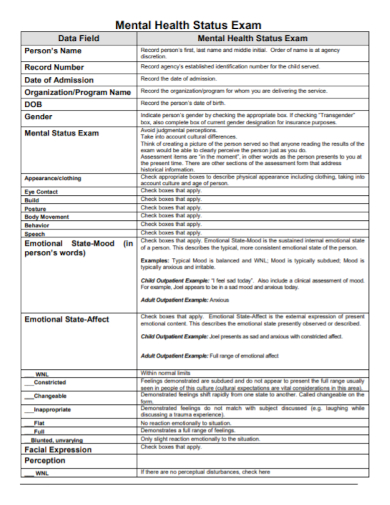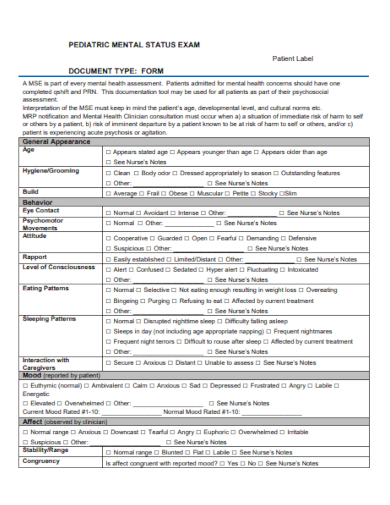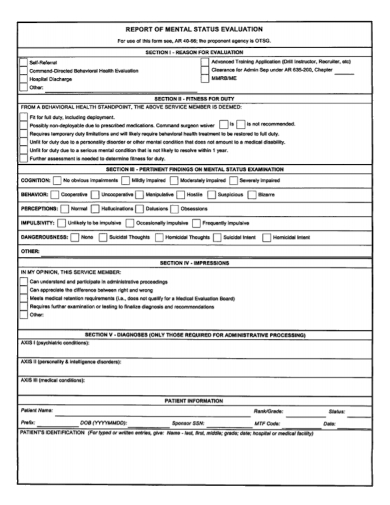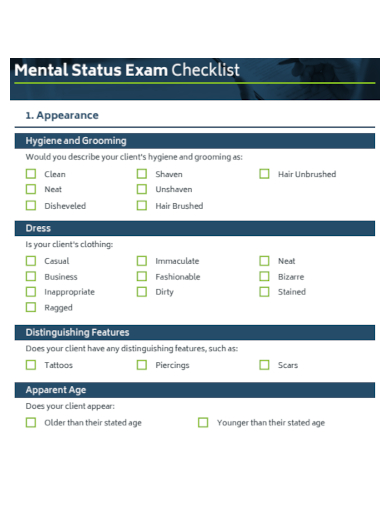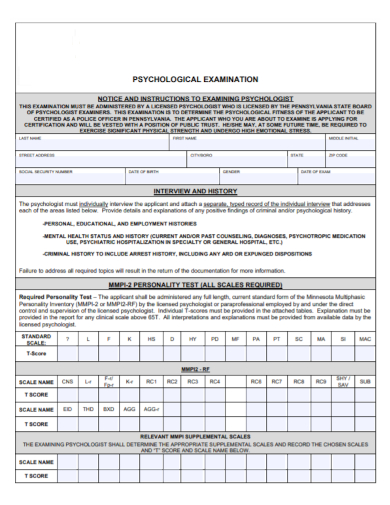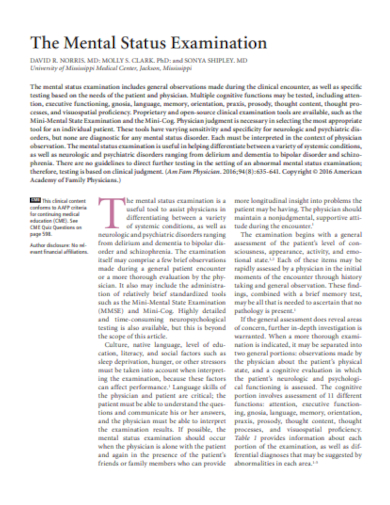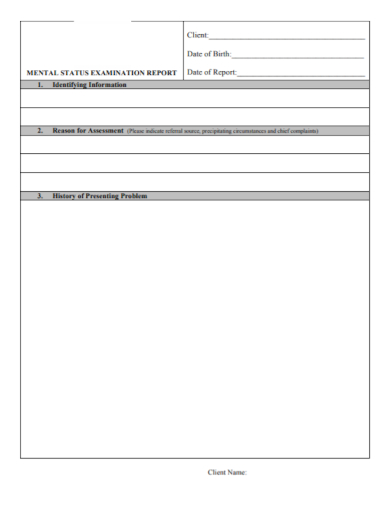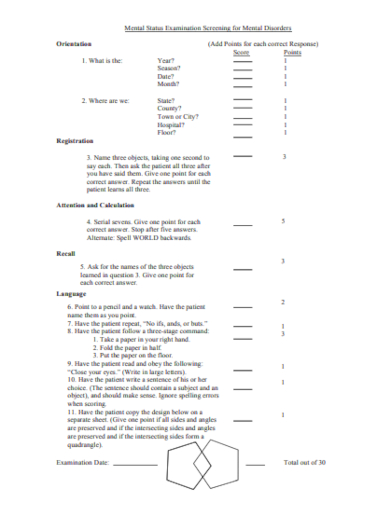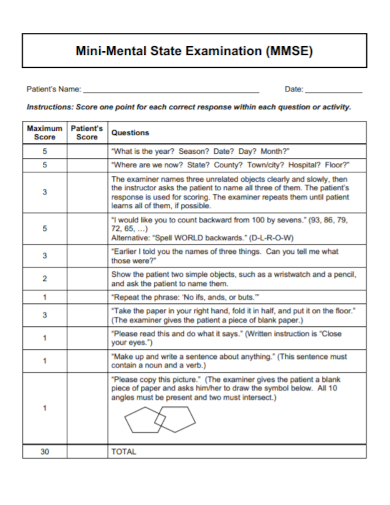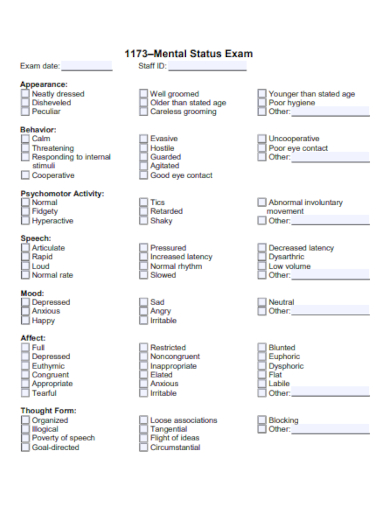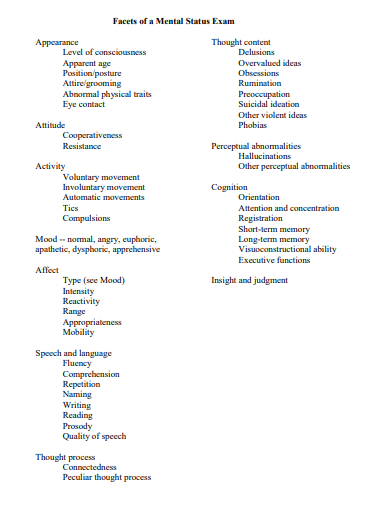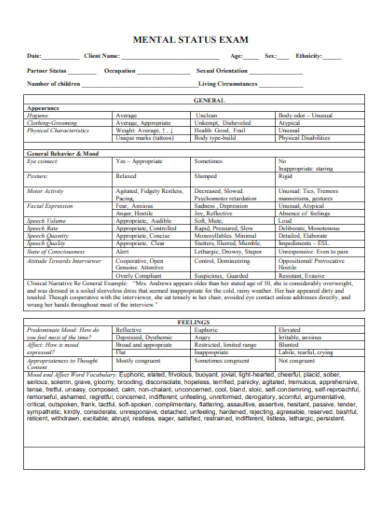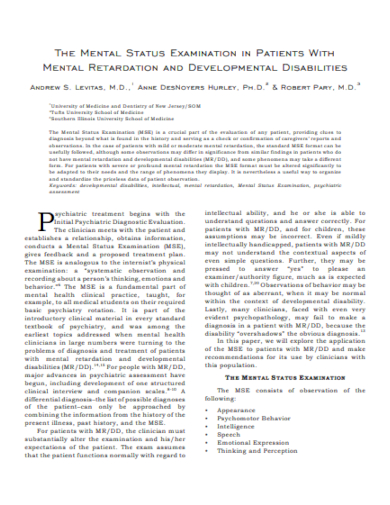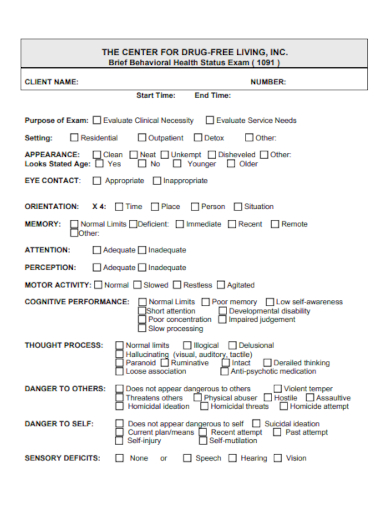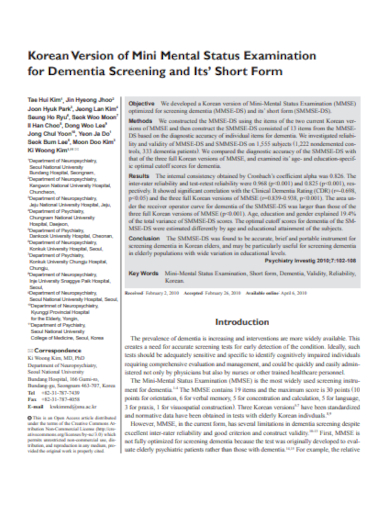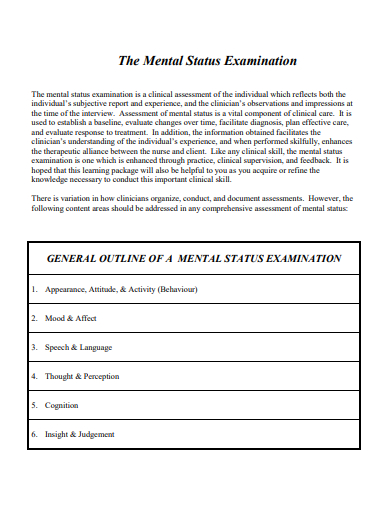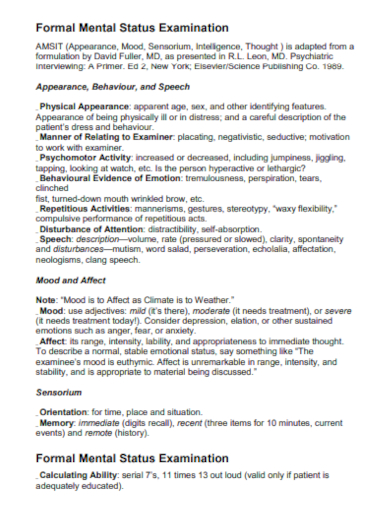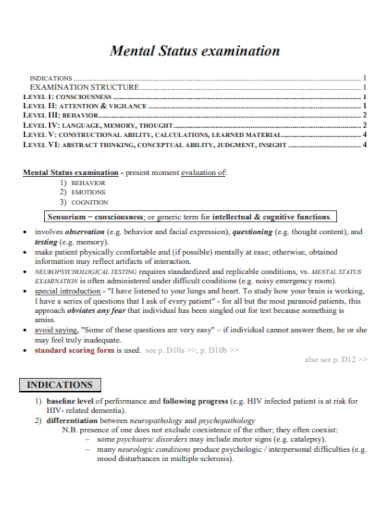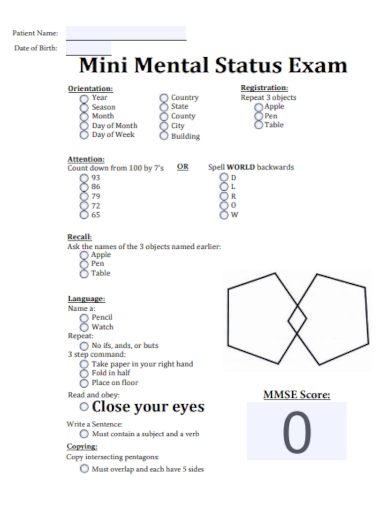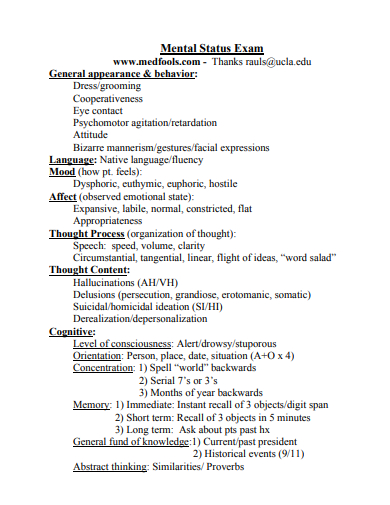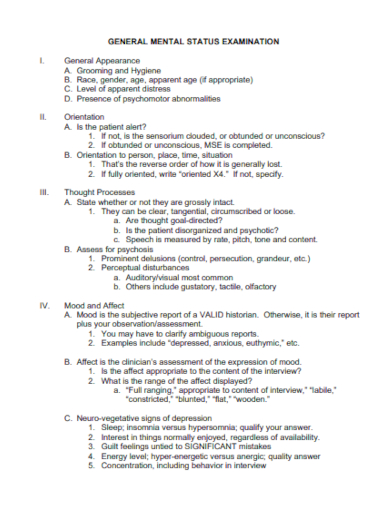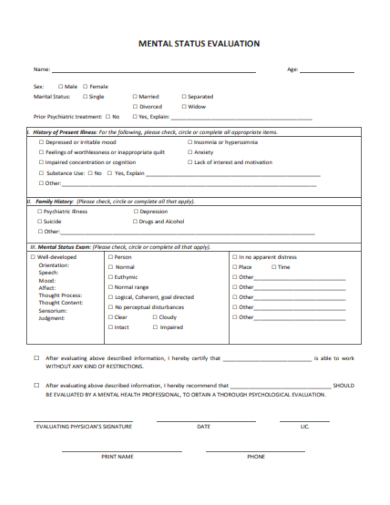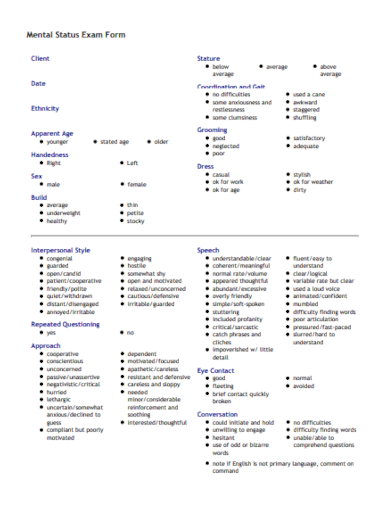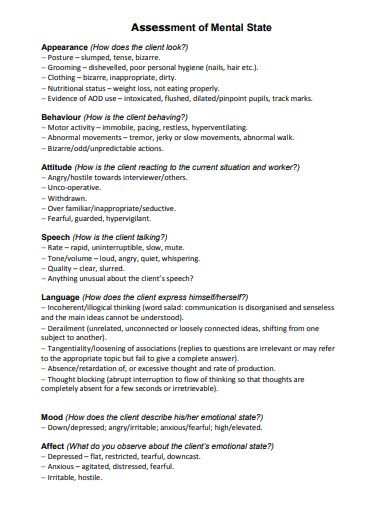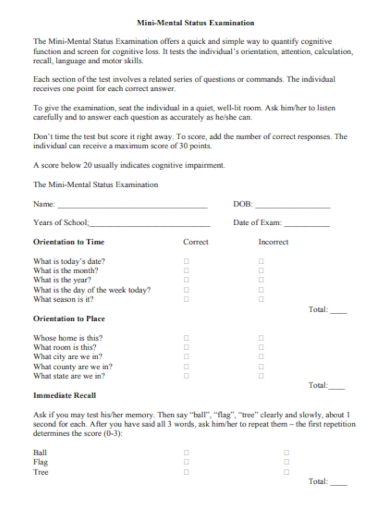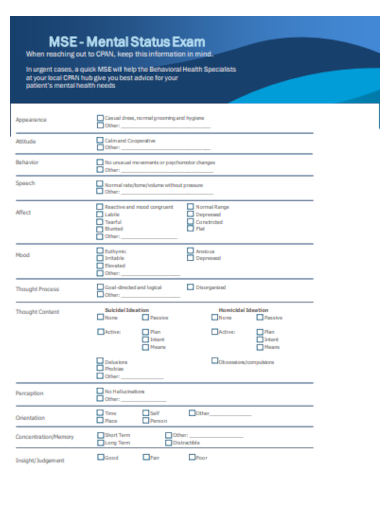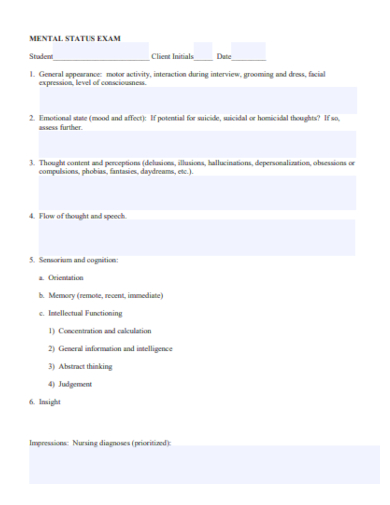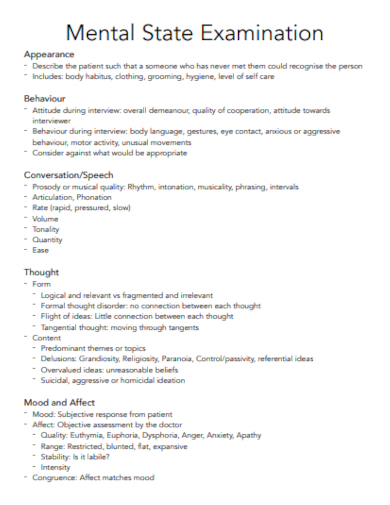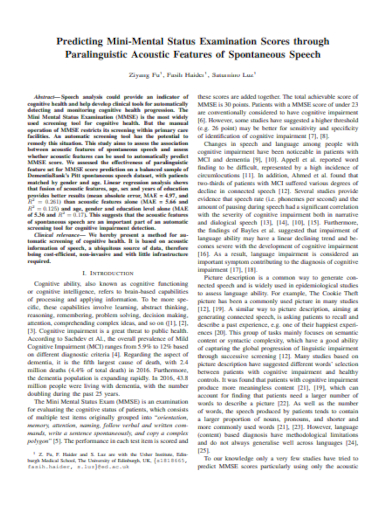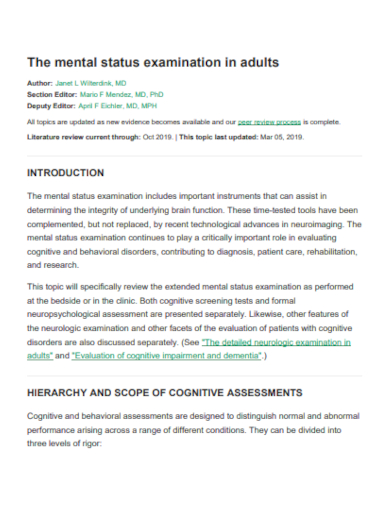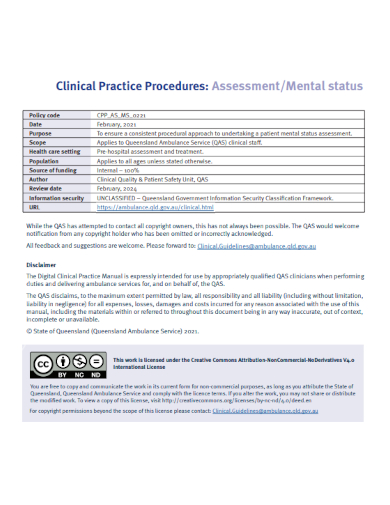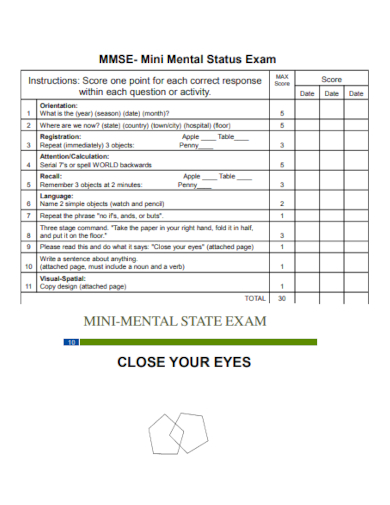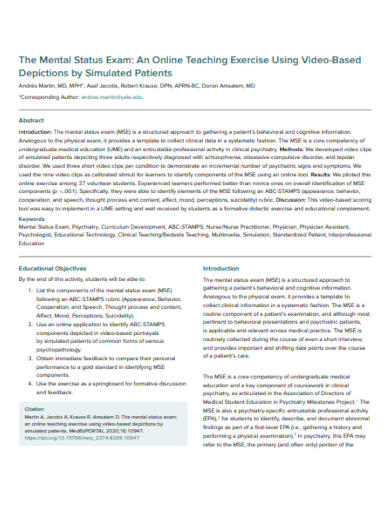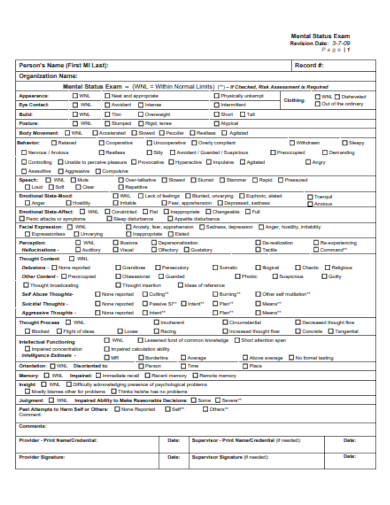There are times when people break down and lose their minds due to problems, heartaches, and a lot of stress brought on by various triggers. Especially now that the world is experiencing recessions and pandemics, it is no wonder that many people are undergoing psychiatric and psychological problems since they have felt the brunt of their stressors more severely. To help people with these mental health problems, psychiatrists perform mental status examinations to check the condition of the patient and assess the cognitive functions of the individual including their behavior.
50+ Mental Status Exam Samples
1. Case Management Mental Status Exam
2. Mental Status Exam Guidelines
3. Components of Mental Status Exam
4. Mini-Mental State Examination Report
5. Mental Status Exam Goals
6. Mental Status Examination Rapid Record Report
7. Behavior Mental Status Exam
8. Mental Status Software Evaluation Report
9. Mental Health History Status Exam
10. Standardized Mini-Mental State Examination Report
11. Brief Mental Status Exam
12. Mental Status Examination Physician Report
13. Client Mental Status Exam
14. Mental Status Exam Checklist Report
15. Mental Status Examination
16. Mental Status Practice Exam Report
17. Psychiatric Mental Status Exam
18. Mental Health Status Examination Report
19. Pediatric Mental Status Exam
20. Mental Status Evaluation Report
21. Mental Status Exam Checklist
22. Mental Status Psychological Examination Report
23. Sample Mental Status Exam
24. Mental Status Client Examination Report
25. Mental Status Exam Screening for Disorders
26. Patient Mini-Mental State Examination Report
27. Mental Status Exam Form
28. Facets of Mental Status Exam
29. University Mental Status Exam
30. Patients Retardation Mental Status Exam
31. Brief Behavioral Mental Health Status Exam
32. Mini Mental Status Exam for Screening
33. Mental Status Exam Outline
34. Formal Mental Status Exam
35. Standard Mental Status Exam
36. Patient Mini Mental Status Exam
37. Simple Mental Status Exam
38. General Mental Status Exam
39. Mental Status Evaluation Exam
40. Mental Status Exam Recording Sheet
41. Assessment of Mental Status Exam
42. Orientation Mental Status Exam
43. Creative Mental Status Exam
44. Student Mental Status Exam
45. Printable Mental Status Exam
46. Editable Mental Status Exam
47. Adults Mental Status Exam
48. Mental Status Exam Procedure
49. Mental Status Exam Format
50. Online Teaching Mental Status Exam
51. Organization Mental Status Exam
What Is a Mental Status Exam?
The mental status exam is the equivalent of a physician’s physical exam wherein the subject of the assessment is the cognitive functions of the patient. To get the exact clinical prognosis of a psychiatric patient, the mental health professional would check the way the patient moves, how they talk or act, their train of thought, perception of things or situations, their overall mood, and their attitude towards the examination or the examiner themselves. It is a very complicated examination and that is why it requires a professional mental clinician to conduct it.
How to Conduct a Mental Status Exam?
In conducting a mental status exam, you need to have material where you can write your observations. Then, you will need your examination tools as well as an assistant should the patient become unruly in the middle of the assessment. To conduct the mental health exam, here are some of the components that you will need to assess.
1. Appearance
The first thing you need to take note of about the patient is the way they look. Do they look healthy and clean? Do they look like they haven’t gone out in years? What are they wearing? One thing to take note of when looking at someone’s mental health status is their appearance, such as their grooming, as it shows whether they are in sound mind or if they look like they have just been existing but not living.
2. Behavior
Next, take a look at their behavior. Do they fiddle around? Do they avoid eye contact or touches? Do they squeak or get nervous when someone comes close to them? If you think that they talk too confidently, try to take subtle notice of their finger movements, how they avert their eyes, body posture, and more.
3. Attitude
After that, try to gauge their attitude when you ask them questions. Are they cooperative? Do they answer your questions with openness or hostility? Does their smile look genuine? How they show the patient acts toward you can be a subtle hint that can help you assess whether they are mentally troubled or are just momentarily experiencing anxiety or stress.
4. Speech
Do your patients slur when they talk? Are their voice too loud or do they whisper as if they are scared of something? Do they shout most of the time? Does everything they say make sense to you? Another important thing when assessing your patients is to notice the way they talk and how frequently they talk.
5. Mood
One of the many symptoms that a patient is experiencing mental health problems is that their moods always fluctuate faster than seconds. One moment they are happy and the next they are crying or showing hostility. Try to assess whether your patient is showing symptoms of distress and or serious mental health by gauging their moods.
6. Insights and Thoughts
Normal individuals with healthy and sound minds are very mindful of what they say and they are genuine with how they share their views on certain topics. But those who are not in the right mental state tend to showcase obsessive thoughts such as self-harm, and may even display symptoms of paranoia and delusion. This part is one of the most challenging sections of the assessment as you need more time to come up with an exact diagnosis by consulting with the patients as much as you can.
Why is mental health examination important?
Many people are suffering from endless bouts of mental health disorders due to stress and trauma. To help the patients become better, psychologists and psychiatrists needed to conduct mental status exams to get the proper prognosis of their disorders and cure them accurately.
What are the examples of mental health disorders?
Some examples of mental health disorders include schizophrenia, hallucinations, paranoia, personality disorders (bipolar, narcissistic, obsessive), PTSD, bulimia or eating disorder, anxiety, severe depression, and many others.
Why is it important to check our mental health?
Aside from our physical and emotional health, our mental health should be checked regularly so that if there are any issues, they can be addressed quickly. If our mental health suffers, other medical treatment wouldn’t be that effective especially if the disorder has already affected the physical body.
Addressing the current issues of mental health is very important so that people may be made aware of what happens when one’s mind is suffering from disorders that cannot be seen by the naked eye. An examination is also helpful since some disorders are hard to pinpoint, and only professionals will be able to help those who are suffering mentally. Download our editable and printable mental status exam sample templates today by visiting our website.
Related Posts
FREE 8+ Sample Mental Health Assessments in MS Word PDF
FREE 8+ Sample Physical Assessment Forms in PDF MS Word
FREE 7+ Sample Health Assessments in PDF MS Word
FREE 9+ Clinical SOAP Note Samples [ Pharmacist, Documentation ...
FREE 8+ Biopsychosocial Assessment Templates in PDF
FREE 9+ Inpatient Progress Note Samples [ Psychiatric, Hospital ...
FREE 50+ Sample Medical Forms in PDF MS Word
FREE 7+ Sample Discharge Summary Templates in PDF MS Word
FREE 10+ Psychotherapy Progress Note Samples in PDF
FREE 10+ Mental Status Examination Report Samples [ Mini ...
FREE 10+ Mental Health Discharge Summary Samples [ Treatment ...
FREE 8+ Neuropsychological Evaluation Report Samples ...
FREE 9+ Psychosocial Assessment Templates in PDF MS Word
FREE 10+ Biopsychosocial Assessment Form Samples [ Adolescent ...
FREE 7+ Sample Health Assessment Templates in PDF MS Word ...

